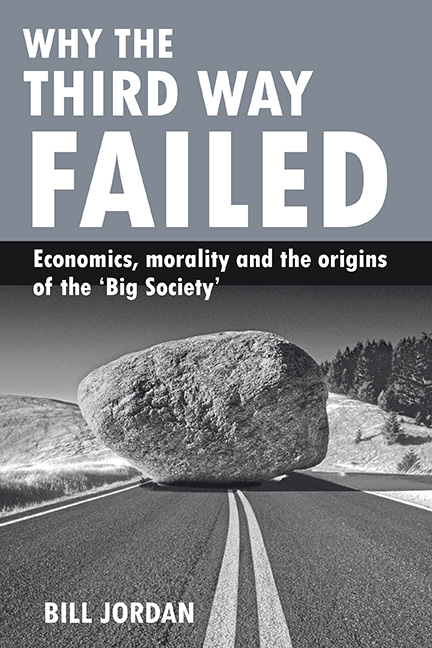Introduction
Published online by Cambridge University Press: 01 September 2022
Summary
The economic crash of 2008-09 put the UK and US, along with several smaller states (such as Iceland, Ireland and Latvia), back where they had been before the boom years of 2001-07. It exposed as illusory the gains achieved by these economies, with their reliance on their financial sectors and cheap credit, and created mountains of public debt. But, more seriously, it exploded the claims of Third Way governments, especially New Labour in the UK, to have reconciled global markets with new, ethically informed public policies.
The Third Way was a set of ideas and policies, first developed by former President Bill Clinton in the US and former Prime Minister Paul Keating in Australia, which was supposed to have made the liberal left electable, and provided a blueprint for the reform of government in an era of globalisation. Although it suffered setbacks, particularly in the election of George W. Bush to the US presidency, and John Howard as Australian Prime Minister, its political dominance in the UK, and the new regime at the World Bank from 1997 onwards (Stiglitz, 2002) meant that it continued to be deployed, modified and tested, and to influence centrist and liberal left politics worldwide during all the years from 1992 to 2010.
This book argues that the ultimate failure of the Third Way has been a moral one, and that this has stemmed from an inadequate and incoherent analysis of how ethical principles can be applied to the workings of a market economy exposed to global forces. This failure has left whole populations disillusioned about politics in general, and liberal left politics in particular. It remains to be seen whether Barack Obama, as President of the US, can transcend this cynicism, and demonstrate an ability to discover more convincing approaches.
Tony Blair came to power in 1997 with grandiose moral slogans, both in domestic and foreign policy, but the Iraq war and the economic crash left almost all of these in ruins. On the domestic front, improvements in poverty, youth unemployment, workless households and educational opportunity had all been reversed, and New Labour's reforming energies exhausted.
- Type
- Chapter
- Information
- Why the Third Way FailedEconomics, Morality and the Origins of the 'Big Society', pp. 1 - 20Publisher: Bristol University PressPrint publication year: 2010

